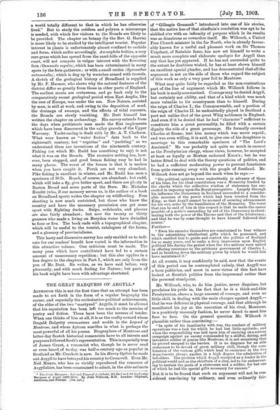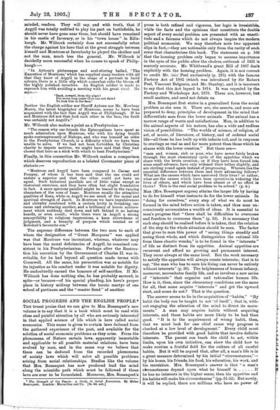THE GREAT MARQUESS OF ARGYLL.*
ALTHOUGH this is not the first time that an attempt has been made to set forth in the form of a regular biography the career, and especially the ecclesiastico-political achievements, of the elder of the two "martyred" Argylls, it must be allowed that his reputation has been left too much to the mercies of poetry and fiction. These have been the reverse of tender. When one thinks of him at all, it is as the crafty coward whom Dugald Dalgetty overmasters and scolds in the Legend of Montrose, and whom Aytoun scarifies in what is perhaps the • most powerful of all his poems. Biographers of Montrose and latter-day Scotch historical romancists have to all intents and purposes followed Scott's representation. This is especially true of James Grant, a romancist who, though he is never read or even heard of to-day, was half-a-century ago as popular in Scotland as Mr. Crockett is now. In his Harry Ogilvie he made out Argyll to have betrayed his country to Cromwell. Even Mr. Neil Munro, who has so vividly reproduced the romance of Argyllshire, has been constrained to admit, in the able estimate • The Great Marquess Life and Times of A rehibatd. Sth Edrt and Id (and only) • Marquess of Argyll (16074t161). By John Willcook, B.D. London: Oliphant, Anderson, and Ferrier. DOB. net.] of "Gillespie Grumach" introduced into one of his stories, that the native hue of that chieftain's resolution was apt to be sicklied o'er with an infirmity of purpose which in its results was as disastrous as cowardice itself. Mr. Willcock, a United Free Church minister in the far North, who is already favour. ably known for a useful and pleasant work on Sir Thomas Urquhart, of Rabelais fame, has now set himself to write a much more complete and elaborate apologia for Argyll than any that has yet appeared. If he has not succeeded quite to the extent he doubtless wished, he has at least shown himself an excellent special pleader, and has demonstrated that all the argument is not on the side of those who regard the subject of this work as only a very poor foil to Montrose.
What may quite fairly be regarded as the non-contentious part of the line of argument which Mr. Willcock follows in his book is easily summarised. Courage may be denied Argyll, but certainly not ability, and that of a kind which was much more valuable to his countrymen than to himself. During the reign of Charles I.; the Commonwealth, and a portion of the reign of Charles IL he undoubtedly played in Scotland a part not unlike that of the great Whig noblemen in England. And even if it be denied that he had " character " sufficient to constitute him a great personality, he filled with a certain dignity the role of a great personage. He formally crowned Charles at Scone; lent him money which was never repaid ; and was even willing, it is said, to give one of his daughters in marriage to this remarkable specimen of " The Lord's Anointed." He was probably not quite so much in earnest as the Presbyterian clergy, whose views, however, he accepted at least as loyally as Morton endorsed Knox's ; but he was better fitted to deal with the thorny questions of politics, and be had a sufficient moderating power to prevent fanaticism from quite running away with the people of Scotland. Mr. Willcock does not go beyond the mark when he says :— "His political opinions were undoubtedly in advance of those of his time, for his ideal constitution was a Monarchy limited by the checks which the collective wisdom of statesmen has suc- ceeded in imposing upon the Royal prerogative. Largely through his influence the Democracy in Scotland succeeded to a consider- able measure of the power which had been wrested from the King; so that Argyll cannot be accused of securing advancement for his own order by the humiliation of the Monarchy. The worst that can be said of him in this respect is that he made the career possible of a noble's succeeding by aid of the Democracy in check- mating both the power of the Throne and that of the Aristocracy; and that he was by some thought to have himself followed that c°urse-" Further-
" Even his enemies themselves are constrained to bear witness to the astonishing intellectual gifts which he possessed, and which enabled him to guide and control the politics of Scotland for so many years, and to make a deep impression upon English political life during the period when the two nations were united in offering resistance to the arbitrary government of Charles I., and in breaking down the military power by which he would fain have maintained it."
At all events, it may confidently be said, now that the events of this period can be contemplated calmly, that Argyll was a born politician, and must in mere virtue of this fact have looked at Scottish politics from the impersonal rather than the personal standpoint.
Mr. Willcock, who, to do him justice, never, disguises, but proclaims his pride in, the fact that he is a thick-and-thin Presbyterian, shows a large amount of courage, and even no little skill, in dealing with the main charges against Argyll,— that he was deficient in physical courage, and that although he manifested his joy at the execution of his rival, Montrose, in a positively unseemly fashion, he never dared to meet him face to face. On the general question Mr. Willcock is plausible rather than convincing :— " In spite of his familiarity with war, the conduct of military operations was a task for which he had but little aptitude; and when the responsibility was laid upon him of carrying on a serious campaign against an enemy commanded by a skilful, daring, and inventive soldier of genius like Montrose, it is not surprising that he proved unequal to the burden. It is no disgrace for an able statesman to be devoid of great military skill, though the com- bination of the various gifts which lead to eminence in the two departments always excites in a high degree the admiration of beholders. The position which Argyll occupied as a leader in the political world and as the chieftain of a clan, led to his endeavour- ing to sustain the parts of a statesman and a soldier, for but one of which he had the special gifts necessary for success."
But it is to be feared that such an argument will not be con- sidered convincing by ordinary, and even ordinarily fair- minded,. readers. They will say, and with truth, that if .Argyll was totally unfitted to play his part on battlefields, he should.never have gone near them, but should have remained in his castle of Inverary, or in his "town house " in Edin- burgh. Mr. Willcock certainly does not successfully rebut
the charge against his hero that at the great struggle between himself and Montrose at Inverlochy be played the skulker and not the man, much less the general. Mr. Willcock is' decidedly more successful when he comes to speak of Philip- laugh :—
. "In Aytoun's picturesque and soul-stirring ballad, The Execution of Montrose,' which has supplied many readers with all that they know of Argyll in the shape of a portrait in lurid colours, there is a little slip which soinewhat rubs the bloom off the highly polished invective. An English soldier is made to reproach him with avoiding a meeting with his great rival. He says :—
'Back, coward, from thy place For seven long years thou has not dared To look him in the face.'
Neither the English soldier nor Sheriff Aytoun nor Mr. Mowbray Morris, the latest biographer of Montrose, seems to have been 'acquainted with the fact that Argyll was at Philiphaugh. If he and Montrose did not then look each other in the face, the fault was certainly not Argyll's."
Mr. Willcock also makes a point as a Presbyterian :— "The reason why our friends the Episcopalians have spent so much admiration upon Montrose, who with his dying breath spoke contemptuously of Bishops, and who was himself an elder in the Presbyterian Church, is a difficulty which we have been unable to solve. If we had not been forbidden by Christian charity to impute motives, we might have said that they had chosen that hero as a stick with which to beat Presbyterians."
'Finally, in this connection Mr. Willcock makes a comparison which deserves reproduction as a belated Covenanter piece of rhetoric :— " Montrose and Argyll have been compared to Caesar and Pompey, of whom it has been said that the one could not endure a superior and that the other could not have an equal. Such historical parallels are of little value except as rhetorical exercises, and they have often but slight foundation in fact. A more specious parallel might be traced in the varying characters of the sons of Isaac. Montrose recalls the attractive qualities of Esau, while in Argyll we see much of the moral and spiritual strength of Jacob. In Montrose we have impulsiveness and chivalry combined with a certain levity in forsaking one cause and embracing another, and a brilliancy of heroic achieve- ment which suddenly died down and left behind it no lasting benefit, or even result ; while there were in Argyll a strong susceptibility to religious impressions, a keen shrewdness of judgment, and a tenacity of purpose which remind us of Rebekah's favourite son."
The supreme difference between the two men to each of whom the designation of "Great Marquess" was applied was that Montrose was inconstant, whereas, whatever may have been the moral deficiencies of Argyll, he remained con- sistent in his Presbyterianism. Perhaps after the Restora- tion his execution by the Government of Charles II. was in-
evitable, for be had beyond all question made terms with Cromwell. All the same, his persecution was as notable for its injustice as his conduct under it was notable for dignity. He undoubtedly earned the honours of self-sacrifice. If Mr.
Willcock has done nothing else, he has probably secured, in spite—or because—of his special pleading, his hero's proper place in history midway between the heroic martyr of one school of partisans and the " master fiend " of another.







































 Previous page
Previous page